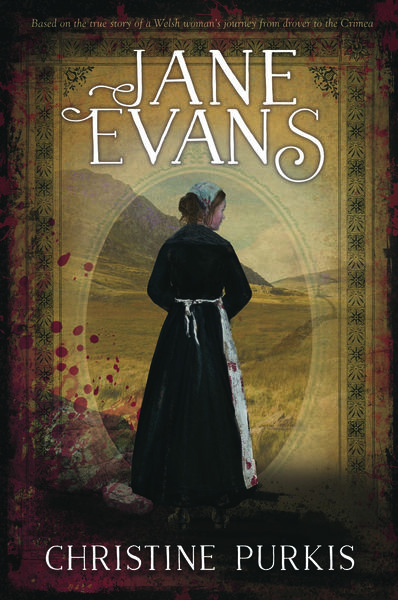Unsung working class woman who nursed with Florence Nightingale the inspiration for novel
This week sees the publication of Jane Evans, the inspirational story of a real woman born in poverty-stricken rural Victorian Wales who went from pig farmer to first female drover to working as a nurse alongside Florence Nightingale, Mary Seacole and Betsi Cadwaladr in the Crimean War. Jane Evans is the story of a forgotten working class heroine and her will to survive.
Author Christine Purkis uncovered a few basic facts as she was researching the real Jane Evans, whose life is celebrated by a plaque in the chapel at Pumsaint. A pig farmer from Caio, Carmarthenshire,. she was a pioneer, becoming the first woman ever to join the Drove, walking livestock all the way from rural Wales to the lucrative markets of London. Not content with this, she then travelled to Scutari in Turkey to work at Florence Nightingale’s hospital, and then on to Balaclava (in present day Ukraine), where she nursed soldiers injured in the Crimean War.
“I have worked around the few facts we know of her life, creating a fictional Jane. Chiefly the novel is about Jane’s resilience: her development and growth, her private battles with a very personal God and her need to make sense of her very hard life,” said Christine Purkis.
“I first read of Jane Evans whilst visiting a friend in Rhandirmyn, Carmarthenshire, in The Drovers’ Roads of Wales by Fay Godwin and Shirley Toulson. That summer, by sheer coincidence, I was given a book on Florence Nightingale written by Cecil Woorham-Smith. Jane Evans’ name was mentioned again as having nursed with Florence Nightingale, surviving to return at the end of the war – along with a heifer which was given to her by the men she had nursed!”
The detail in the novel expertly evokes the period, and Jane’s story is very involving. The account of the drove, a major part of farming history in Wales, is fascinating, as is the depiction of rural Welsh culture at this time.
“I wrote the novel originally as part of my MA in Creative Writing at Bath Spa University. I researched the facts during a six month period – walked part of the drovers route from Llanymddyfri to Padbury, flew to Scutari, then to Balaclava on the Crimean Peninsula.”
Given that the arena of the Crimean War was so small, Jane Evans came into direct contact with Florence Nightingale, Mary Seacole and Betsi Cadwaladr in their mutual battle against the inhumane conditions. Conditions in the army hospital in Scutari before Nightingale began working to improve them were described as utterly appalling – injured men were without blankets or decent food, unwashed and often still wearing their filthy army uniforms. Typhus, cholera and dysentery were rife and caused a high proportion of deaths amongst injured soldiers.
Jane Evans was just one of the many early nurses who made a real difference amidst all the suffering, but are now all but forgotten. “My novel sets out to celebrate the largely unsung contribution of working class women to this period of history,” said Christine Purkis.
